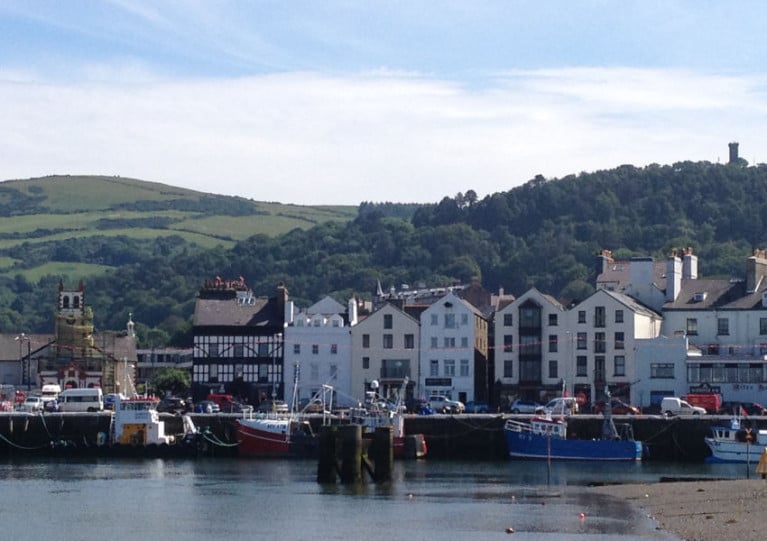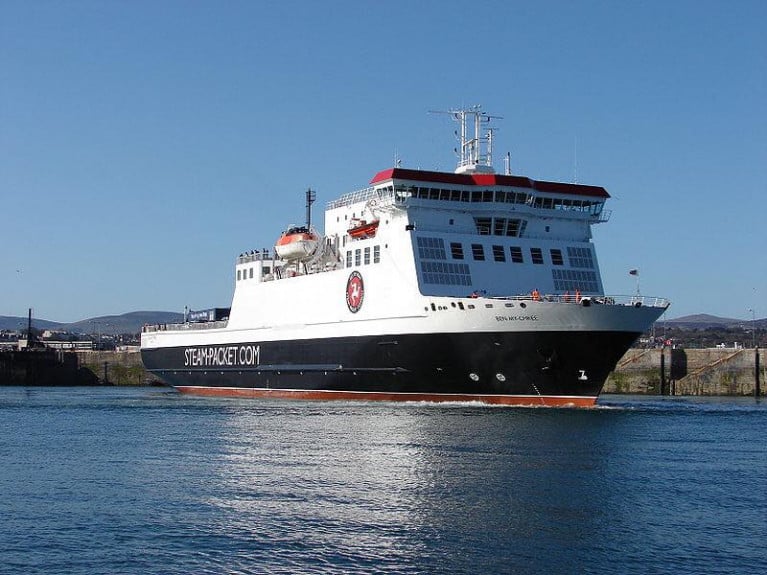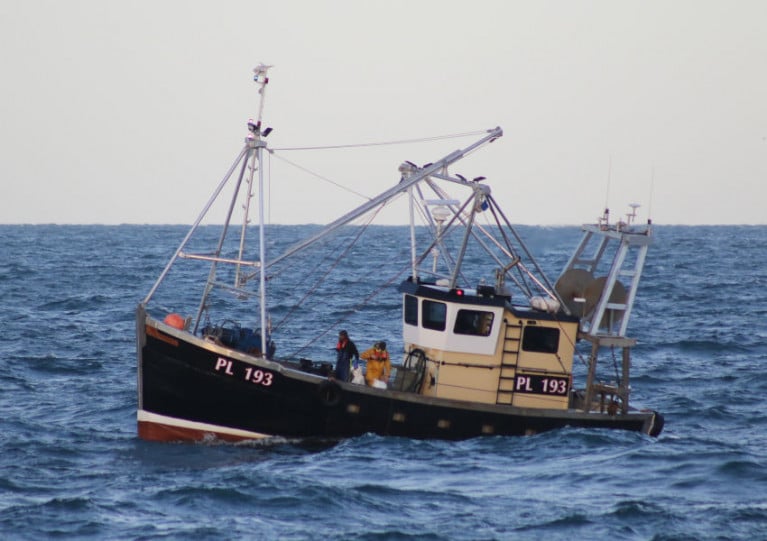Displaying items by tag: Isle of Man
Ferry passenger numbers carried by Isle of Man Steam Packet Company for last year, were the highest for 16 years.
Figures from the operator which has routes between Douglas and Heysham, Belfast, Dublin and Liverpool, reveal more than 623,000 passengers were carried on board in 2023. In addition last year there were over 196,000 vehicles loaded on and off for onward transport.
Also last year, in August, the Steam Packet’s new flagship, Manxman entered service on the core Douglas-Heysham route in which traffic figures from the new ferry were also included for last year.
The Isle of Man-England route is the only year-round operated service of the company’s four route network which also connect Northern Ireland and the Republic.
Statistics also show the highest numbers seen by the Steam Packet took place in 2007, the year that marked the TT's 100th anniversary.
After the challenges faced during the Covid pandemic, the Manx Government owned company has since seen that the numbers reflect a "positive trend" forward.
There was a rise in 2023 of more than 27,000 passengers when compared to the previous year and an increase of more than 3,500 vehicles than in 2022.
The previous highest traffic figures were during that TT centenary year, when the Steam Packet carried 632,942 passengers and 197,745 vehicles.
More from BBC News also on Merseyside developments.
Isle of Man Divers Return Iconic Ship's Bell from Wreck Site of S.S. Dundalk
Dundalk is where a team of divers from the Isle of Man visited the Co. Louth port town so to bring the bell of the steam ship flagship, S.S. Dundalk back to a grateful town.
As EnergyFM reports, divers of Discover Diving based in Port, St. Mary, on the Manx south coast, were guests of honour of Dundalk’s Louth County Museum.
Artefacts of the Glasgow built flagship of the Dundalk and Newry Steam Packet Company were retrieved from the wreck. They consist the bell and its wrought-iron hanger, a porthole and a washbasin which were handed over to the county museum.
As Afloat previously reported, S.S. Dundalk during WWI was attacked on 14th October, 1918 by a German submarine during a return trip from Liverpool’s Collinwood Dock to Dundalk. The cargo ship's main trade was cattle, produce and also the carriage of passengers.
The torpedo attack led to the sinking of the 234ft long merchant ship and claimed 21 people. Only 12 survived, some of which were brought to Douglas from the incident that took place just weeks before the end of World War 1 and of the crew, they mostly were local to the Dundalk area.
On the 100th anniversary of the sinking, a committee of descendants of the crew, travelled to the Isle of Man to unveil a memorial clock on the Castletown River waterfront. The clock is in memory to those who tragically lost their lives.
For more,Energy FM reports more on the return of the ship's bell.
Also in the centenary year, Afloat reported of a ceremony held on board the Isle of Man Steam Packet's Mannanan which saw the fast ferry take a special detour to the wreck site some 60 miles offshore.
On the 92nd anniversary, the Dundalk Sub Aqua Club divers carried out a commemorative dive to the wreck site. The divers laid a plaque of remembrance which Dundalk town council had sponsored.
Entries Open for 2022 Round Mann Yacht Race
Far Shore Merchants has announced its sponsorship of the Peggy Round Mann Yacht Race which takes place on 3rd-4th June 2022 over the extended Jubilee weekend holidays.
The 65 nautical mile circumnavigation of the Isle of Man, organised by the Isle of Man Yacht Club, will start as usual from Port St Mary at 7 am with competitors given a 30-hour time limit to complete the course. It is open to any ballasted sailing vessel and is well-known amongst the sailing community for its challenges of tricky tidal conditions as well as unpredictable weather.
This year’s event has been renamed Peggy Round Mann Yacht Race after Far Shore Merchant’s popular brand, Peggy Dark Rum. The rum itself was named in honour of the Isle of Man’s most famous and oldest surviving wooden yacht which sailed the Manx seas in the 18th Century and has been linked to tales of mystery and intrigue in its past life.
Doug Hey, Co-Founder and Managing Director of Far Shore Merchants, said “We are thrilled to support the Round Mann Yacht Race, one of the key events in the Island’s sailing calendar. With many of our products having a nautical theme, it seemed a great opportunity – and a very apt way – to help a local sailing organisation continue a long-held tradition.
“We are looking forward to seeing a good entry on the day and will be following the race as it progresses. We’ll also be very happy to share a well-deserved tot of Peggy Dark Rum with competitors in the bar at the end of the race!”
Commodore of the Isle of Man Yachting Club Phil Hardisty said, “We are very grateful to Far Shore Merchants for sponsoring our 40th-anniversary race and for bringing their PR and marketing experience to the event.
“The Peggy Round Mann Race is unusual in today’s era of competitions as it is more of an offshore “sprint” with its 30-hour time limit. Tidal and weather conditions usually ensure that there is much for teams to consider as they navigate their way around the Island so it is an exciting prospect for yachtsmen and women.
“With the event taking place in the middle of this year’s TT Fortnight, as well over the Jubilee Bank Holiday weekend, we are looking forward to increased numbers of both competitors and spectators.”
For more information and to enter for the Peggy 40th Anniversary Round Mann Yacht Race, go here
Howth Yacht Club’s Cruising Group has planned its first cruise of the year, sailing to Ardglass in Northern Ireland and the Isle of Man from Thursday 19 to Saturday 21 May.
The club advises all interested parties to contact Susan Kavanagh directly, as the Cruising Group is always happy to welcome new members into the fold.
Ahead of that, the group’s first armada of 2022 will be to Lambay Island this coming Saturday 7 May.
Early risers can get a head start by registering for the Darkness Into Light sunrise sail in aid of Pieta House. Boats will leave the harbour for Ireland’s Eye at 5am alongside the pier walk from The Light House, HYC’s new pergola.
If you would like to sail but don't have a boat, get in touch with Susan Kavanagh, who will be happy to find you a seat for this special cause.
Ramsey Marina Plans on the Isle of Man Raise Objections
Despite plans for a significant multi-million-pound investment in marine leisure in the Isle of Man, plans for a marina in Ramsey to be known as the 'marina at the crossroads of the Irish Sea' have met with significant objections.
As regular Afloat readers will know, Ramsey Marina Limited (“RML”) opened registration for expressions of interest for berths at the proposed site in February.
"The beach is a marine conservation area, a very sandy much loved free communal beach and is subject to fierce waves in the autumn/ winter months. 65,000 signed a petition opposing the plans", Ramsey Resident Ruth Gale told Afloat.
"I appreciate the benefits that added tourism could bring to the town but not at the cost of one of the nicest public beaches on the island", she said.
A petition to save Ramsey South Beach and the Marine Nature Reserve from destruction has raised 65,000 signatures.
The petition, entitled ’Stop the Destruction of the Ramsey Bay Marine Nature Reserve’ was launched by Facebook group ’South Beach Ramsey - Save the Bay’, after it was discovered the marina proposal was due to be re-launched last year.
The Ramsey Marina proposal would see full-scale dredging of Ramsey Bay, with reclaimed land used for the construction of a housing estate and marina on the public beach.
According to a 2019 DEFA survey, it is home to many important species of fish and aquatic plants, including eel grass, which thrives in the area and is 35 more times effective at carbon capture than rainforest trees.
The plans would see the beach between the historic Queen’s Pier and the Stone Pier given to private development.
Another resident, Josephine Sebastian told Afloat "the overwhelming majority of the residents of Ramsey do not want this marina. RML are proposing to build this abomination on most of the beautiful shallow sandy bay called south beach.
It’s the wrong place…in every sense".
The petition is here
Isle of Man's Proposed Ramsey Marina Seeks Expressions of Interest
Ramsey Marina Limited (“RML”) to be known as the 'marina at the crossroads of the Irish Sea' has opened registration for expressions of interest for berths at the proposed Ramsey Bay Marina on the Isle of Man.
It's a welcome development given the Isle of Man lies at the epicentre of significant multi-million-pound investment in marine leisure by the Governments of Scotland, Ireland, Wales and Northern Ireland yet in terms of marine leisure facilities, the Island is conspicuous by its lack of similar investment.
Promoters say Ramsey Bay Marina will be a 24/7 all-weather marina located immediately to the south of the entrance to the historic port of Ramsey on the Isle of Man. It will have 400 berths with a minimum depth of 3m. The berths for larger vessels, up to a maximum of 25m, will have between 5 and 6m depth. RML plans to keep 20% of the berths set aside for visitors.
Located at the crossroads of the northern Irish Sea, Ramsey is ideally suited for cruising the coasts of England, Scotland and Ireland. The Isle of Man itself (the only whole nation to become a UNESCO Biosphere) provides a lovely cruising ground for visiting yachts, with many ports under a day’s sail from Ramsey. In addition, Ramsey is an ideal “stopping off” point for those yachts transiting the Irish Sea.

Ramsey Marina will have full amenities and access to repair and maintenance facilities, as well as a wide range of shops offering everything from chandlery to local artisan foods.
Alongside the marina will be a mixed-use residential/commercial development. The residential units will range from 1 bedroom apartments to 3-4 bedroom townhouses. These will be ideal pieds-à-terres for yachtsmen who would like to keep their vessels in Ramsey on a permanent basis.
Berthing fees will be on a par with other similar marinas in the Irish Sea.
 The overall investment in building the marina will be in the region of £100m, which includes roughly £50m to build the marina itself and the other £50m to cover the cost of building the associated mixed use commercial/residential development.
The overall investment in building the marina will be in the region of £100m, which includes roughly £50m to build the marina itself and the other £50m to cover the cost of building the associated mixed use commercial/residential development.
RML is also planning to set up the Island’s “National Maritime Sports Centre” which will apply for full accreditation with the RYA, British Canoeing and others to provide courses catering for beginners through to professional qualifications. Similar to other centres it will offer accommodation.
The marina will host a range of bars and restaurants in addition to those already in the town of Ramsey. It will also include a boutique hotel that will showcase the Island’s local food, including its world-renowned shellfish.
Further details of the proposed marina can be found at www.ramseymarina.com.
To register an interest in a berth, download and complete the form from the website. Once completed please submit to: [email protected]. Respondents will receive a formal acknowledgement of receipt of the forms by RML. Priority will be given strictly on a “first come, first served” basis.
Jail for Jet Ski Novice Who Broke Isle of Man’s Pandemic Rules After Sea Crossing from Scotland
A man has been jailed for four weeks on the Isle of Man after breaking coronavirus rules by riding a jet ski from Scotland to the island.
As Sky News reports, 28-year-old Dale McLaughlan — who had never before used a personal water craft — embarked on difficult crossing in rough conditions last Friday (11 December) to visit his partner, whom he met on the island in the Irish Sea while working as a roofer in September.
It’s understood McLaughlan took the drastic measure after he was twice denied a visitor’s permit to the island, which has implemented strict access rules for non-residents to control the pandemic.
However, the move has cost McLaughlan dearly as local police confronted him at the weekend while he was on a night out.
“He was wholly inexperienced in operating a jet ski,” the Isle of Man’s deputy high bailiff said. “He deliberately attempted to avoid detection and circumvent the entry regulations in place to protect the Isle of Man.”
Sky News has more on the story HERE.
The Isle of Man Ship Registry, which is one of the world's leading flag states, is set to launch the first ever seafarer welfare app designed by a ship registry.
Director of the Isle of Man Ship Registry Cameron Mitchell said the app is in the final stages of development and is set go live later this month. It will be available for free to around 11,000 seafarers sailing on more than 400 vessels under the Isle of Man flag.
Cameron, who served as a marine engineer at sea for 17 years with shipping lines including Maersk and Farstad, said the introduction of the app is being accelerated to tackle the immense challenges facing seafarers caught in the coronavirus pandemic.
“Safety is a fundamental pillar of our ethos as a high-quality flag state,” he said. “Even before Covid we recognised that something had to be done that delivered tangible results to help seafarers in the wilderness of the sea. We recognised that while there is support for seafarers in port, through the many brilliant chaplaincies and seafarer charities, the ‘weak link’ is support while at sea. I raised it at the Red Ensign Group and with the seafarer charity ISWAN and it was clear to us that the problem of seafarer mental health was becoming more acute, with seafarers spending more time alone in their cabin than ever before. The app has many functions but a key one is to provide social activities to get seafarers interacting more on-board to combat that isolation.”
Cameron said the IOM team has produced the app with maritime training organisation Tapiit, which will live stream its support and training sessions via the app.
“The app provides structured welfare support for the seafarer from nutritional advice to live interactive support sessions for mental health and fitness,” he said. “The feedback we are receiving from ship owners, both clients and non-clients, is really positive. Ship owners want to find new better ways to help and protect seafarers and want to embrace digital innovation. We hope this app will be a step forward for the industry and make a positive difference to many thousands of seafarers sailing under the Isle of Man flag.”
Cameron said he was introduced to Tapiit through Merseyside cluster organisation Mersey Maritime and said it is doing a brilliant job producing an app that gives such a breadth of support and functionality.
Richard Turner, CEO of Tapiit, which has offices in Liverpool and the Isle of Man, said the functionality of the app will be ground-breaking and range of services and support greater than any app currently available to seafarers.
“The Tapiit team is very excited to develop this crew welfare app with Cameron and his team at the Isle of Man Ship Registry,” he said. “From my time working at Shell and setting up Tapiit mental health, in particular, has always been the key problem area we have sought to tackle, so we are very much on the same wavelength as the IOM. Cameron has been very specific about what the IOM wants and when it goes live it will be the most comprehensive crew welfare app in the world. We also have a number of large organisations partnering the app, who will be announced soon, and as a result will be able to offer support, through the app, to crew worldwide both on-board ship and in port. The app is designed to make seafarers lives easier and happier so it is not a one-off download, it can be so useful and supportive it can become part and parcel of what seafarers do each day.”
Isle of Man Ship Registry background
Based in Douglas on the Isle of Man, the Isle of Man Ship Registry is one of the most respected registries in the world, consistently appearing at the top of the Paris MoU White List which ranks registries by performance.
The Isle of Man Registry is a quality flag of choice, a bespoke choice, that offers reliability and quality of service. The Registry is a Category One member of Red Ensign Group and an International Registry.
The Registry is run by a team of professionals dedicated to providing the very best in service. Backed by sophisticated electronic systems, it is able to register ships quickly and efficiently to suit all time zones and has on-line systems to smooth the processes for clients. An ISO 9001 and 14000 certified organisation, the Registry operates efficiently and consistently to exceed the standards expected of a modern Flag State.
With its in-house technical expertise, the Registry provides advice and regulatory oversight for the ships and yachts on the register, in a pragmatic and commercially sensitive manner. This partnership working and service-culture is what attracts clients to register more of their ships in the Isle of Man. Its portfolio of clients includes many of the world’s blue-chip ship owners and prestigious super yachts.
With 24/7 response and a growing network of surveyors in key locations, the Ship Registry provides a swift response to allow owners and managers to keep their ships operating in a competitive global industry. Backed by a Government which strongly supports the maritime sector, the Registry is operated on a cost-neutral platform, allowing its fee structure to be extremely competitive.
The Isle of Man Ship Registry offers high quality and superb service at a low cost. The Registry combines all fees into one annual fee payment whereas some open registries charge for almost all additional services. At the Isle of Man Ship Registry there is no annual tonnage tax based on size of ship, no inspection fee, no consular fee, no casualty investigation fees and it offers a discount for multi ship fleets as well as fee incentives for environmentally friendly ships.
This combination of quality service and a competitive fee structure ensures clients receive great value.
Ferry sailings to and from the Isle of Man have been updated as the Manx government announced it's easing travel restrictions.
As Manx Radio reported, Chief Minister Howard Quayle announced yesterday the Isle of Man is moving from stage five to four on its borders framework.
From Monday, 20 July, Manx residents can travel to the UK and beyond, as long as they self isolate for two weeks once they return.
The Isle of Man Steam Packet has therefore revised its schedule, running two daily sailings between Douglas and Heysham on the Ben-my-Chree on most dates from Friday, 24 July.
It will also provide a daily fast craft service to Liverpool on the Manannan from Fridays to Mondays, also starting from the 24 July.
RNLI fishing safety manager Frankie Horne has urged the fishing community to avail of safety training that is on offer for their crews and to ensure that their safety equipment is up to date.
It comes after the skipper of a fishing vessel that sank late last year off the Isle of Man has attributed their rescue to the safety training the crew had undertaken previously and to their lifejackets, which were fitted with personal locator beacons (PLBs).
On the evening of 23 November last year, the fishing vessel Polaris suffered a catastrophic hull failure in the Irish Sea off the west coast of the Isle of Man.
The vessel sank so rapidly that the skipper only had time to send out a Mayday to the coastguard and other surrounding fishing boats before the vessel became submerged.
The coastguard immediately launched two RNLI lifeboats, from Port St Mary and Port Erin, and a rescue helicopter. However, it was a local fishing vessel, Lynn Marie, which arrived first on scene.
The skipper and a crew member from Polaris had been in the water for at least 15-20 minutes before help arrived.
The skipper of the Lynn Marie feared the worst on arriving at the scene as the Polaris had already gone below the water. The skipper stopped his engine to listen for the crew of the Polaris, which proved a wise decision as he heard two men in the water shouting. The Lynn Marie crew located them with a search light and recovered them from the water.
‘I can tell you that there is no doubt that the lifejackets saved our lives’
Commenting on the rescue, Horne said: “After speaking with Gordon Mills, the skipper of the Polaris, and the crew of Lynn Marie on their arrival at Peel, it was quite clear that this could have been a very different story had the crew of both vessels not acted so professionally.
“The crew had attended safety training and wore lifejackets fitted with personal locator beacons which had increased their chances of survival.”
Gordon Mills, skipper of Polaris, added: “At no time did I feel our lives were in danger due to our training and equipment.
“We had a policy of wearing lifejackets on the working deck since attending refresher training, where I was shown a film involving fishermen wearing their normal working clothes, being put through their paces in the RNLI Survival Centre Environmental Pool, both with and without lifejackets in cold water with wave movement whilst attempting to recover themselves.”
Mills added: “To see fishermen struggling in a controlled environment and only lasting a few minutes or in some cases a few seconds without the lifejacket makes you think about your own safety.
“I can tell you that there is no doubt that the lifejackets saved our lives. We wouldn’t have even been afloat for the crew of fishing vessel Lynn Marie to recover us from the water had we not been wearing them.
“I would encourage all fishermen to start wearing their lifejackets while on deck — you just never know when you might need it.”

































































